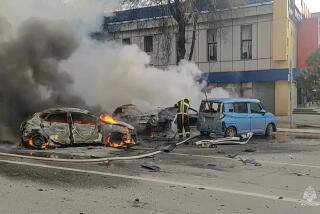Macedonian Army Attacks Guerrillas From Air
- Share via
TETOVO, Macedonia — Army helicopters swooped over a mountain within sight of this city and fired several rockets at suspected guerrilla hide-outs Saturday in the first air assault of Macedonia’s month-old ethnic conflict.
The government wasted little time deploying the two MI-24 attack helicopters after acquiring them Friday from Ukraine. The late-afternoon strike came a few hours after ethnic Albanian rebels on the mountain sent two mortar rounds into a Slavic neighborhood near a police checkpoint, wounding four civilians.
Macedonia’s army and police, ill prepared for ground combat against the mountain-based insurgents, have been fighting back mainly with long-range artillery. The government’s introduction of air power raised the stakes in a conflict that holds the risk of heavy civilian casualties on both sides.
The lightning helicopter attack sent up plumes of dirt and smoke over a slope of Mt. Sar Planina, which looms above Macedonia’s second-largest city. There was no word of any casualties.
So far, the intensity of fighting centered mostly on Tetovo has been low. Macedonia’s Slav-led government has held back a threatened large-scale offensive against the rebel National Liberation Army, which says it is fighting for equal rights for the ethnic Albanians who make up nearly a quarter of Macedonia’s 2 million people.
President Bush on Friday and U.N. Secretary-General Kofi Annan on Saturday joined a chorus of international appeals to the government here to act with restraint against the guerrillas--said to number a few thousand--and to work with elected Albanian political leaders to address legitimate grievances.
The Macedonian leadership, which brands the rebels separatists and terrorists, gave the world leaders a testy reply Saturday. “We thank them for their recommendation,” said government spokesman Antonio Milosovski, “but Macedonia is a sovereign state, so any decision to use any kind of force against terrorists is only ours.”
Prime Minister Ljubco Georgievski told reporters late Friday that a political decision had been made to strike the rebels hard.
“Now it is up to the military to judge when conditions are right for a successful operation,” he said. “It could be one hour or one day or one week. It is completely up to the military.”
The government has urged civilians to leave mountain settlements occupied by the rebels. Milosovski said Saturday that hundreds of villagers had asked the Slav-run Macedonian Red Cross to escort them from Sipkovica near Tetovo. The Red Cross is awaiting assurances that police can protect such a convoy from rebel snipers, he said.
Thousands of people have already fled Tetovo, de facto capital of Macedonia’s Albanian community. Hundreds are gone from its Slav quarter, where Saturday’s mortar attack, apparently aimed at the police checkpoint 50 yards away, tore part of the tile roof off Simka Simovska’s red brick house.
Relatives led the weeping 78-year-old matriarch to a car and drove off in search of safer quarters. The family escaped harm, but three men and a woman were wounded by a spray of shrapnel outside the house on Koltuk Street, named for a hero of Macedonia’s fight for independence a century ago against the Ottoman Empire.
Survivors of the attack pointed to a 100-foot-long trail of blood on the cobblestone and then up at the mountain. “Terrorists!” they shouted.
The guerrillas recently opened a new front, engaging Macedonian troops along the border with Kosovo, the ethnic Albanian province of Serbia that the North Atlantic Treaty Organization freed from Yugoslavia’s domination in 1999. Tank, cannon and mortar fire echoed along the border Saturday as the Macedonian army rushed in reinforcements.
Macedonia has urged NATO to crack down on arms shipments from Kosovo to the rebels around Tetovo. Following Sweden’s lead, Italy pledged Saturday to send 200 paratroops to beef up border patrols of the U.N.-led international force in Kosovo. Others, including France and the United States, are sending unmanned aircraft over the border to gather intelligence for the Macedonians.
Western governments have been reluctant to send troops to Macedonia. But Germany, with 1,000 soldiers already deployed in Macedonia as part of the U.N.’s KFOR peacekeeping effort for Kosovo, felt obliged Saturday to promise reinforcements--to protect its own mission.
The number of troops and timing of the deployment will depend on events here, German officials said. German troops recently seized a cache of illegal weapons in Macedonia and came under fire from the gunrunners, presumably ethnic Albanians, before shooting dead two of their mules.
Gen. Harald Kujat, Germany’s top uniformed officer, noted with concern that his forces are exposed to both sides of a growing conflict with no legal mandate to intervene.
“If a political solution is not found quickly, and if arms shipments to [Macedonia] are not halted, there is a growing risk of civil war,” he told the Welt am Sonntag newspaper in an interview for today’s editions.
*
Times staff writer Carol J. Williams contributed to this report from Berlin.
More to Read
Sign up for Essential California
The most important California stories and recommendations in your inbox every morning.
You may occasionally receive promotional content from the Los Angeles Times.













